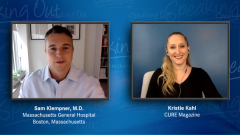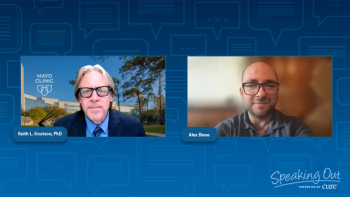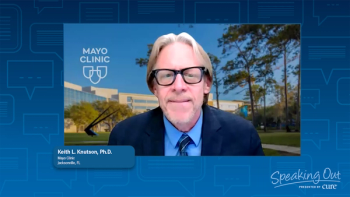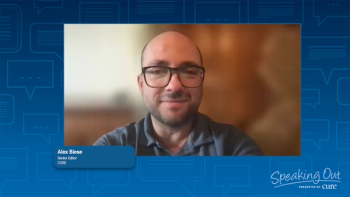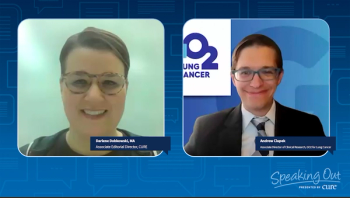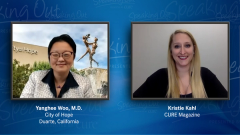
Importance of Clinical Trials for Gastric Cancer
Dr. Sam Klempner describes limitations in caring for patients with gastric cancer and emphasizes the importance of participation in clinical trials to help advance treatment.
Kristie Kahl: Hi, my name is Kristie Kahl, vice president of content at MJH Life Sciences™, the parent company of CURE® magazine. In this edition of the “Speaking Out” video series, on behalf of Hope for Stomach Cancer, we are speaking with Dr. Sam Klempner from Massachusetts General Hospital about the need for more research and clinical trials in gastric cancer. Hi, and welcome.
Sam Klempner, M.D.: Hey, thanks for having me.
Kristie Kahl: Thank you. To start, what are the challenges we see in gastric cancer research?
Sam Klempner, M.D.: There are a lot of challenges in gastric cancer research, unfortunately. Some of them center around resources and funding to conduct the research. It’s unfortunately a bit of an underfunded tumor type compared to some of the [cancers like] colon, breast, that we hear a lot about. Then there are challenges around understanding the disease biology. This is a really interesting group of tumors that are quite different when you get into the molecular level. Then, how to translate those findings back to patients so that we are giving each patient as close to an individualized approach as we possibly can, because we feel like that may have the chance for best outcomes. But there are a lot of challenges, and funding and access are only one of them.
Kristie Kahl: Definitely. What are we doing to address those challenges?
Sam Klempner, M.D.: There are a lot of efforts. There are efforts in the gathering of data so we understand who these patients are. There seems to be trends of increasing rates of stomach cancer in some younger populations, potentially women and Latinx patients specifically. Understanding who these people are helps us understand, are there patterns? Are there areas that we can influence? So, there are some national patient-facing research programs where patients can enroll themselves and contribute as much as they are willing about themselves and their tumor. That goes into a big database. Then there are projects that are restricted to specific institutions. One cancer center might be studying one question. Another might be studying another question. Of course, a lot of our research happens through clinical research and clinical trials. That’s probably the main mechanism for advancing the care of patients.
Kristie Kahl: Absolutely. With that, why is it important for patients to consider joining a clinical trial?
Sam Klempner, M.D.: I think clinical research and clinical trials is a very broad topic. There are a lot of differences between a phase 1, and a phase 2 and a phase 3 trial. We always try to have that conversation with patients. But I think we are never satisfied with the options we have out there. Although, there have been some nice, recent developments with incorporating immune therapies earlier and combining with HER2 [human epidermal growth factor receptor 2] therapies. This is all great for patients. Anything that improves outcomes is good. However, it’s never good enough. Trials offer the chance of getting something that may become the new standard in phase 3 settings. It’s really the only way for patients to get access to what may be better than what’s already out there. In phase 3, that’s the main goal—are we advancing the care and improving the survival? Then in phase 2 and phase 3, we have to make sure our drugs are safe and potentially effective before we go testing them in hundreds and thousands of patients. They serve a very important foundation for building up to a phase 3 trial.
Kristie Kahl: What are the challenges or barriers that we see with patients joining a trial right now?
Sam Klempner, M.D.: There are always challenges to getting on a trial. Sadly, one of the immediate upfront ones is, is it available to you somewhere near where you live? This is a big problem because a lot of trials are centered in large cities where large cancer centers are. The majority of our patients are cared for out in the communities where they live. Getting access to clinical trials and getting awareness of clinical trials out to patients, and out to community practices, is always a big problem. If you don’t know about it, there is no chance you are going to enroll in it. Then there are of course some disease and cancer-specific inclusion and exclusion criteria, checkboxes you have to pass to go on to the trial. Some of it is related to the cancer. Sometimes patients are very symptomatic, or they have a very large amount of disease. It may not be safe to wait a week or two for them to get in and get enrolled in a trial. Sometimes it can take longer. Those are more individual factors, but there are broader factors; access and awareness is one of the biggest upfront barriers to getting more patients onto clinical research.
Kristie Kahl: One of the challenges we hear a lot is that there are some misconceptions about clinical trials. Sometimes we hear patients say they don’t want to be a guinea pig, or that they are just going to receive a placebo. How can try to negate those misconceptions patients might have?
Sam Klempner, M.D.: Every trial is designed a little differently. In large phase 3 trials when you are trying to advance the standard of care, you need to compare it against something. In some cases, that may involve a placebo. I think patients should be reassured that in that setting, they are still receiving what is our best-known available therapy. They may not be getting the experimental drug that’s added on top of it. But they are still getting what is currently the best standard. There is no compromise to their care. But I understand sometimes there are reservations around placebos. I think this comes back to education; educating our patients and having these conversations with every one of our patients. I think there is no harm in hearing about a trial. There are some situations where people may have preexisting conceptions about trials and feel like they are being experimented on, as you said. But there is no downside to having a conversation. Coming in, having an appointment, talking about a new trial doesn’t commit you to doing it. But it is an opportunity to learn and have some of these questions answered. Perhaps some of those can be put to rest so that they are more comfortable with participation. This is not true of stomach cancer alone. It’s true of all tumor types, and all clinical research, and it’s something the field is working on. We need to be better about the way we present the information, where patients can go to get a broad, unbiased understanding of what clinical research entails. I think there is a lot of work for advocacy groups, guideline committees, and providers to keep educating patients, and getting some of these attitudes better understood.
Kristie Kahl: Absolutely. Obviously, there is a lot of research going on. It sounds very exciting. What do patients with gastric cancer have to look forward to when it comes to clinical trials and research?
Sam Klempner, M.D.: I think there is a lot to look forward to. Even [during] the last two months, we’ve seen some substantial advancements that came from participating in clinical trials. Nothing would change without our patients being willing to try new things. Even last week we saw an FDA [Food and Drug Administration] approval for a combination involving immune therapy with a HER2 therapy and chemotherapy. There is a lot to look forward to. I think the big themes are going to be around learning as much about your cancer as possible, whether this comes from biomarker testing or blood-based biomarker testing. I think we are going to see that coming more and more, where we find a target that might be in one patient’s tumor and not in another patient’s tumor. We are funneling and directing therapy based on tumor knowledge. Usually, that translates to the best outcomes and survival, which is the goal. As we get more tools in the toolkit with more new drugs and new targets coming, we expect more trials and more ways to improve upon what’s out there. 2021 is a much better time to have gastric cancer than even three or four years ago. I hope that three or four years from now, if we repeat this interview, I’ll be able to tell you about all the advances that have happened, and the next step. And the numbers, and the survival will hopefully be substantially better. Without our patients, there is no way for us to advance the care. It’s very much a team effort. I think there is a lot to look forward to. It’s slicing up gastric cancer into a pie of different targets and understanding how each patient’s tumor ticks. What makes your specific tumor go? And can we target that as a vulnerability?
Kristie Kahl: Absolutely. Thank you so much for joining us today.
Sam Klempner, M.D.: Thanks again. This is a great topic.
Transcript edited for clarity.

